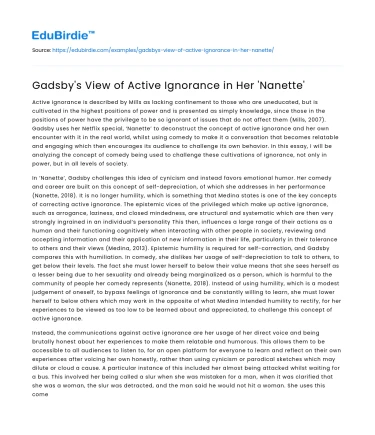Active ignorance is described by Mills as lacking confinement to those who are uneducated, but is cultivated in the highest positions of power and is presented as simply knowledge, since those in the positions of power have the privilege to be so ignorant of issues that do not affect them (Mills, 2007). Gadsby uses her Netflix special, ‘Nanette’ to deconstruct the concept of active ignorance and her own encounter with it in the real world, whilst using comedy to make it a conversation that becomes relatable and engaging which then encourages its audience to challenge its own behavior. In this essay, I will be analyzing the concept of comedy being used to challenge these cultivations of ignorance, not only in power, but in all levels of society.
In ‘Nanette’, Gadsby challenges this idea of cynicism and instead favors emotional humor. Her comedy and career are built on this concept of self-depreciation, of which she addresses in her performance (Nanette, 2018). It is no longer humility, which is something that Medina states is one of the key concepts of correcting active ignorance. The epistemic vices of the privileged which make up active ignorance, such as arrogance, laziness, and closed mindedness, are structural and systematic which are then very strongly ingrained in an individual’s personality This then, influences a large range of their actions as a human and their functioning cognitively when interacting with other people in society, reviewing and accepting information and their application of new information in their life, particularly in their tolerance to others and their views (Medina, 2013). Epistemic humility is required for self-correction, and Gadsby compares this with humiliation. In comedy, she dislikes her usage of self-depreciation to talk to others, to get below their levels. The fact she must lower herself to below their value means that she sees herself as a lesser being due to her sexuality and already being marginalized as a person, which is harmful to the community of people her comedy represents (Nanette, 2018). Instead of using humility, which is a modest judgement of oneself, to bypass feelings of ignorance and be constantly willing to learn, she must lower herself to below others which may work in the opposite of what Medina intended humility to rectify, for her experiences to be viewed as too low to be learned about and appreciated, to challenge this concept of active ignorance.
Save your time!
We can take care of your essay
- Proper editing and formatting
- Free revision, title page, and bibliography
- Flexible prices and money-back guarantee
Instead, the communications against active ignorance are her usage of her direct voice and being brutally honest about her experiences to make them relatable and humorous. This allows them to be accessible to all audiences to listen to, for an open platform for everyone to learn and reflect on their own experiences after voicing her own honestly, rather than using cynicism or parodical sketches which may dilute or cloud a cause. A particular instance of this included her almost being attacked whilst waiting for a bus. This involved her being called a slur when she was mistaken for a man, when it was clarified that she was a woman, the slur was detracted, and the man said he would not hit a woman. She uses this comedically using irony in her direct voice, as she was pursuing a sexual interest with the man’s girlfriend, so when she was called the slur under the presumption of being a man it directly contrasted the slur as she would have been heterosexual if she was a man, but the slur was retracted when she was a woman, which then was a homosexual pursuit. This is active ignorance because the man was ignorant of the meaning of the slur, which he used in the opposite of the context and was just frankly wrong in his usage. As a straight white man, he enjoyed the epistemic privileges of epistemic arrogance, of which he refused to even acknowledge what he said was wrong, as if the slur had no impact on her and that he had absolute power in taking physical action against those in the LGBT community (Medina, 2013). This then, relayed to the audience a message of reflective irony, of which allowed them to reflect on their own experiences and usage of language towards others and the impacts of such language. This type of arrogance can be described as haughtiness, of being a disdain for other people (Tanesini, 2016). This usage of slurs and misunderstanding of them is an arrogance of disdain for the LGBT community, which is the assumption that as a white man he is exempt from educating himself about the usage of such language and that it is acceptable (Tanesini, 2016). He did not apologize for using such words, more that she was a woman and that he wouldn’t hit a woman. Everyone laughs along with Gadsby, at her shows, but she makes it very clear that there are many people in life who would laugh at her.
In ‘Nanette’, Gadsby explains her style of comedy by creating tension then diffusing it with a laugh, which highlights the epistemic vices of the privileged in the own audience. The audience creates their own tension, which is reflective of the tension those oppressed in society feel every day. She uses this to highlight the fact that people are epistemically lazy to learn and appreciate this, and appreciate that being ‘not normal’ is dangerous. She says that it is no longer her job to fix this tension, it is their tension that the audience must fix with educating themselves and adopting the principles of acknowledgment, engagement, and epistemic equilibrium.






 Stuck on your essay?
Stuck on your essay?

